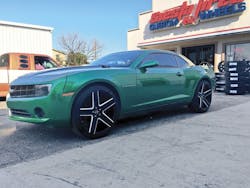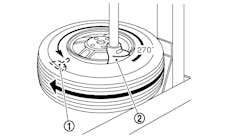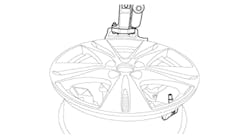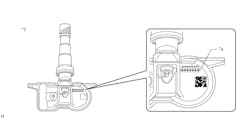A customer walks in with a handful of papers, prices circled, tire brands highlighted. His sporty ride, a 2013 Ford Mustang GT coupe, is parked out front. He needs tires and is ready to buy.
Another customer calls on the phone. She’s shopping for tires for her 2012 BMW 335i sedan, and it’s obvious she’s surfing consumer reviews on the Web while asking you for your recommendation, and your price.
A third consumer is at home, searching for tires online. The 2013 Dodge Charger RT in the garage is ready for its first set of replacement tires. The consumer is gathering information from every source he can find on the Internet.
In all three instances, the options could quickly overwhelm these customers. These high horsepower vehicles are all outfitted with ultra-high performance tires, and in some cases there are at least 70 replacement options on the market. There are run-flats and traditional tires, and lots of specs to consider. There are plenty of brands, too. Each of these three vehicles included offerings from at least a dozen brands. And then there is the biggest consideration of all: price.
Modern Tire Dealer put on its consumer hat and went tire shopping. Using three online sites, MTD shopped the options for the three cars listed above.
With the Ford Mustang, one site featured 73 options from 13 brands for the 245/45R19 tires. They covered four speed ratings and ranged in price from a $96.10 for a closeout edition of the Pirelli P Zero Nero All Season to $352.42 for the Bridgestone Potenza S001 RFT. More than a third of the options for the Mustang were priced at $250 per tire or higher. Another website’s search results showed an even more expensive tire, a Dunlop SP Sport 01A for $478.43.
The results for the BMW and Dodge Charger were just as staggering. The BMW’s 225/45R18 tires came back with the least expensive options, including a $66.97 tire, the Nankang AS-1. It was one of four tires priced at less than $100.
The results for the 235/55R18 tires on the Dodge Charger were just as varied, with options at the $100, $200, and almost-$300 price points, and considerations of all-season or winter tires, run-flat or not, and speed ratings of H, T, V and W.
So how do you close the sale when the consumer comes to you and the options are so wide open?
German Lopez says a couple minutes of conversation with the consumer is all it takes to narrow it down. Lopez manages one of the three Arandas Tire Sales and Repair Inc. stores his mother owns in the Detroit area. In Michigan, Lopez says there’s an obvious first question: “Do they want all-season?” Determining if the consumer relies on this vehicle to get to work during the winter helps to narrow the options.
Fifteen years ago it was more common for consumers to walk in knowing absolutely nothing about the tires on their vehicle, but Lopez says “now they’re a little more educated.” Ten percent ask him about the date the tire was manufactured.
Lopez tries to give every customer “a better tire price and an option of a lower price, because some people don’t have the option to buy the higher end.” Above all, he says he’s honest with the customer. If the customer says he wants to replace all four tires on his vehicle but the rear tires are still in good shape, he’ll tell the consumer that. “You build trust with the customer.”
DD Coley, president of Consumer Tire Inc., says it is really important to ask the right questions. “Otherwise you’re spinning your wheels and talking about product that isn’t applicable.”
Coley and her three brothers, along with an outside partner, own the two-store tire dealership in northern Ohio. Their father started the business in 1962, and they took over in 1985. They operate a nine-bay store in Mentor, Ohio, and a four-bay shop in Chardon, Ohio.
Being in the snowbelt, Coley says the weather is an important consideration, but it’s not where she starts her questions.
“I always ask, ‘How many more miles are you going to keep the vehicle?’” Her second question is usually where the weather comes into play: “What’s important to you?”
“Winter traction is a big factor, and a lot of customers don’t want to run a second set of tires,” she says. “And if they don’t want a set of winter tires, it eliminates a lot of the imports.”
A recent customer came in to buy tires for his wife’s car. The couple wasn’t looking to replace the car in the near future, and the man said safety was his top priority, followed by tread wear. He was hoping for a 60,000- or 70,000-mile warranty, but Coley told him she didn’t have anything quite that long, though she did find a Continental tire with a 50,000-mile warranty. He didn’t want run-flat tires, and they boiled it down to a pair of W-rated tires, one from Continental and the other from Goodyear.
The Goodyear was the most cost effective because of a rebate, but the Continental was going to offer better winter traction.
The customer opted for the more expensive tires.
But the more expensive tires aren’t always the best fit, Coley says.
“If someone’s on a lease and turning it in three months later, there’s no way I’m selling them a Michelin. They don’t need the long life of that tire.
“We try to give them all the answers so they can make the best decision. A lot of our repeat customers, we try to do good, better, best. I’ll give them DD’s picks and two more options.”
Researching tires online before purchasing them from a dealer is increasingly common, but it doesn’t always give consumers a realistic picture, says Armin Flores, manager of Siesta Tires & Custom Wheels in Eagle Pass, Texas.
“Those $100 tires are not going to be the speed ratings of what the car calls for,” Flores says, and his family’s tire shop in this city on the Mexican border isn’t going to put the wrong tire on the vehicle just to save the customer some money.
“If something happens, if there’s an accident, they’ll come back to us.
“As long as it’s the same speed rating and the other specs, we do it. These cars are high performance vehicles. They need tires to match. If all the specs match up we’re willing to put on another tire, a dependable tire.”
A longtime customer of Siesta Tire was driving his 2016 Camaro when he hit a pothole, damaging the rear wheels as well as the 275/35R20 Goodyear Eagle F1 Asymmetric RunOnFlat tires. The customer had purchased a wheel and tire warranty from the car dealer, and the customer was filing a claim to get the wheels and tires replaced. The Goodyear tire is $469.
Flores found another option, a Nitto NT555, for $249.
“That’s a huge difference. It has the same traction, same temperature, tread wear both at 300. It’s a very compatible tire.” He also compared a Hankook Ventus, another option for $249, but it’s not a run-flat.
But the car dealership’s warranty allows the customer to replace the exact tire. “He’s going to stick with the Goodyear.”
If the car dealership’s warranty wasn’t in play, and if the customer had to pay for the fix out of pocket, it may have gone differently. Flores says particularly when it comes to replacing a run-flat tire, there’s a 50-50 chance the consumer will opt for a non-run-flat tire.
“They’re willing to switch over. Some people want exactly what’s on the car. But a lot of people just buy the car because they like it, and they don’t know the tires and all the specs. They’ll switch.” ?




